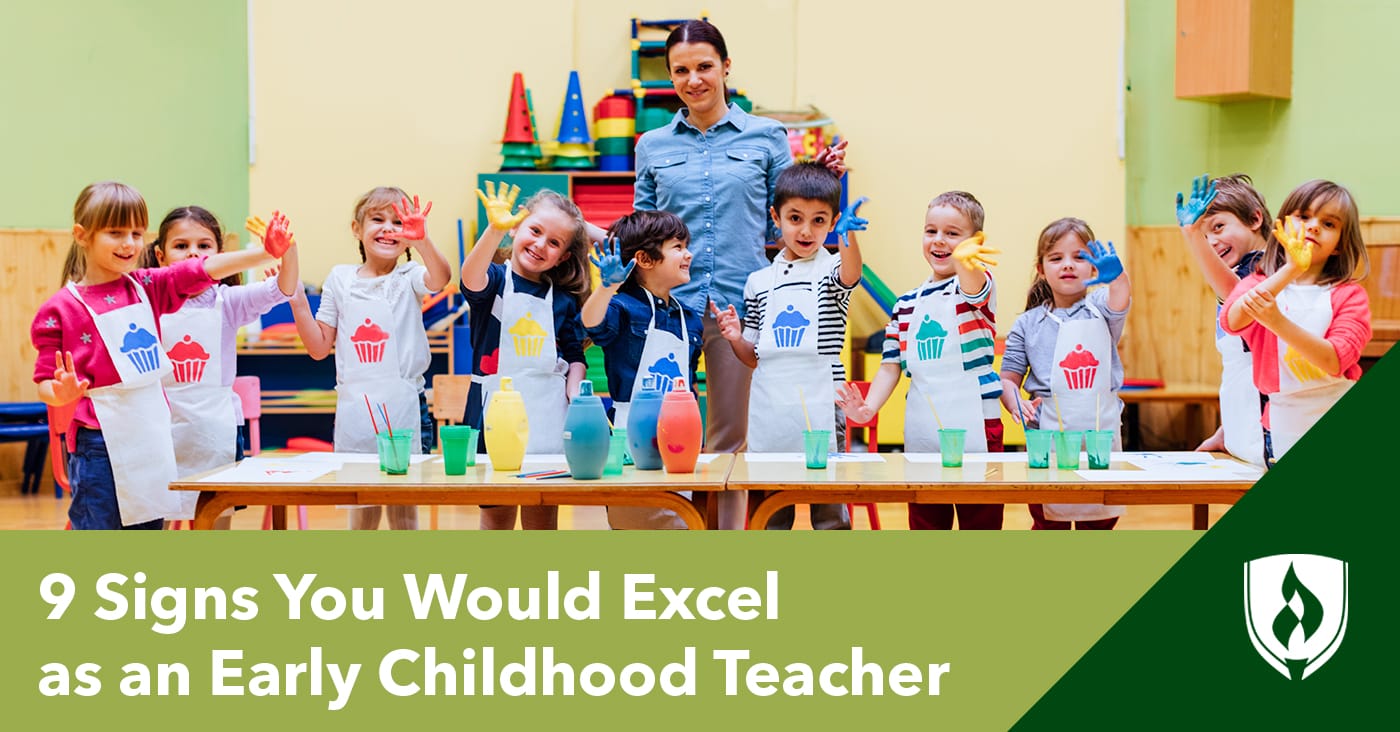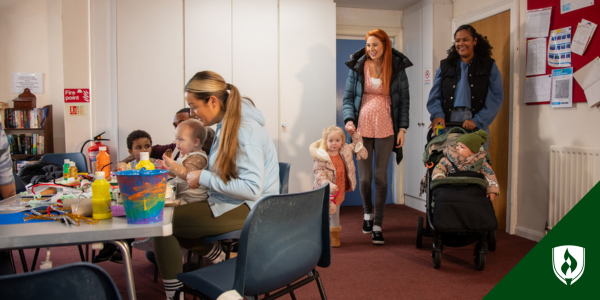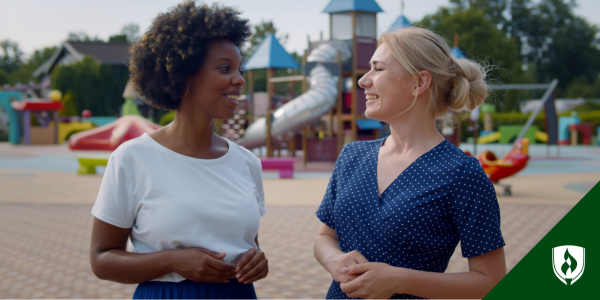9 Signs You Would Excel as an Early Childhood Teacher
By Kirsten Slyter on 04/15/2019

Maybe you grew up playing “school” with your siblings or friends. Maybe you’ve been told you’re good with kids and you would enjoy teaching.
You’ve wondered whether a career in education might be a good fit for you, but you’re not sure. Though it’s always scary to make the jump to a new career, there are actions you can take to reduce risk and grow confidence in your career move. Career aptitude tests and researching potential outcomes for you are a great way to do that. One of the best methods of research is to listen to the people who’ve walked the walk in your future career—they know firsthand what the job entails and what you’ll need to succeed.
To help with that, we spoke to experienced early childhood education (ECE) professionals and asked them to share the traits and characteristics you’ll need to succeed as an early childhood teacher.
You might be a great early childhood teacher if …
1. You manage stress well
Life as a preschool teacher can get a bit hectic. Between huge amounts of paperwork, constant curriculum changes and parent communication—in addition to your daily responsibilities and changing student needs—you’ll always be on your toes. It’s vital to manage your own stress, says Elizabeth Malson, president of the Amslee Institute. “Educators are role models and need to master their tone of voice, facial expressions and choose their words carefully.”
When you’re feeling stressed, Malson recommends making sure the children are safe and sitting quietly nearby and writing. If they’re behaving badly and expecting a reaction, your silence may motivate them to stop what they’re doing and see what’s going on. Who knows? Maybe your calm demeanor will have a soothing effect on the children.
2. You’re a strong communicator
Working with children is an exercise in collaboration. Strong communication is key between teachers, parents and other care providers. Being a strong communicator as an ECE instructor requires you to be empathetic, says Rasmussen University ECE instructor Joyce Monfort. Empathy is critical to being able to understand how children feel when they’re upset and struggling to express why. Since a child’s mood can change moment to moment, an empathetic demeanor will help you address the child in an effective manner for their age.
A strong sense of empathy will also be helpful when communicating with parents. People are naturally protective of their children, so understanding that when providing feedback about their little ones can be a big help.
3. You’re open-minded
Since every child is unique, the best teachers make an effort to get to know each student as an individual—whether they’re outgoing or more reserved, says Malson.
“Being open-minded to the different strengths and opportunities for each child is vital as every child is different and will respond in different ways. If one approach isn’t working, be open-minded to a new idea or approach.”
In addition to personality differences, Monfort says it’s important to recognize how students’ cultural practices and traditions may be different from your own to create culturally sensitive classrooms. She encourages early education teachers to seek information about different cultures and traditions from the students’ families themselves. This will help avoid misunderstandings and assumptions. Your interest in others’ cultures and traditions may be a strength of yours, making your classroom one of creativity and trust.
4. You’re extraordinarily patient
Can you keep your cool in stressful situations? Are you understanding when a child has trouble zipping up their coat in the winter and gets the zipper stuck? Whether patience comes to you naturally or you’ve cultivated it over years of taking care of your siblings or your own children, patience is essential for early childhood educators.
“Children are playful, creative balls of energy,” says Katie Ziskind, owner of Wisdom Within Counseling. It takes patience to handle the students at their most energetic and when they’re crying or upset. Your patience will allow you to handle the unpredictable moments with more ease. Don’t be discouraged if you feel you’re not naturally patient. “Being patient is a skill,” says Ziskind. Use every frustrating moment as an opportunity to practice your patience.
5. You “get” kids
You love being around kids and you understand them. Having a grasp of where your students are at developmentally is vital for early childhood educators, according to Rasmussen University early childhood education instructor Joni Kuhn.
Part of understanding children means understanding how to help them learn appropriate behaviors. You don’t expect a three-year-old to act like an adult, but you know how to use positive strategies that help them grow. “Punishing kids for their behavior is not only archaic, but it doesn’t work in the long run," says Kuhn.
6. You’re determined
Once you’ve decided to do something, you can’t be stopped. You know that bad days always end and better days are on the way. In ECE, you’ll have amazing days and crazy hard ones. On the hard days, you’ll need that determination. That determination will keep you going even when the to-do list seems unending.
7. You’re creative
Teaching can be chaotic and the day doesn’t always go as you expected. “Being optimistic and resourceful are very important qualities for a teacher,” says Ziskind. When things don’t go as planned, you think creatively and use the materials and resources available to you. For instance, if a child wants to play with watercolors, but those aren’t available, you’re able to convince them that colored pencils might be just as fun for another art project.
8. You’re resourceful
Along with brainstorming creative ideas, you always find a way to make them happen. Teachers don’t always have a lot of control over their school’s budget and what they can buy. Early childhood teachers are often good scavengers, frequenting the dollar and thrift stores and always keeping an eye out for potential free or inexpensive supplies to work with.
9. You’re relationship-oriented
“In early childhood education, you’ll work with a wide variety of people—children, family, co-workers, supervisors, community members and legal entities,” says Monfort. This is a daily effort. “We need to meet others where they’re at and work to find common ground with them to collaborate, compromise and work as a team in the best interest of the children and families we serve.”
“Your relationships within your classroom are the foundation for your students’ learning,” says school psychologist Dr. Ari Yares. He’s found that strong relationships between the students and the teachers can help create a safe learning environment. “A connected classroom helps kids grow and minimizes disruptions,” Yares says.
Your relationships with your students, colleagues and families impacts how successful you’ll be as an educator in ECE.
The final sign you should work in early childhood education
Maybe you see many of these qualities in yourself. That’s great! But the most important quality you can have is your excitement seeing your students grow. If you want what’s best for your students, you have the potential to be a great early childhood teacher. Learn more about where an Early Childhood Education degree can take you by visiting our article “What Can I Do with an Early Childhood Education Degree?”
Related Articles:




